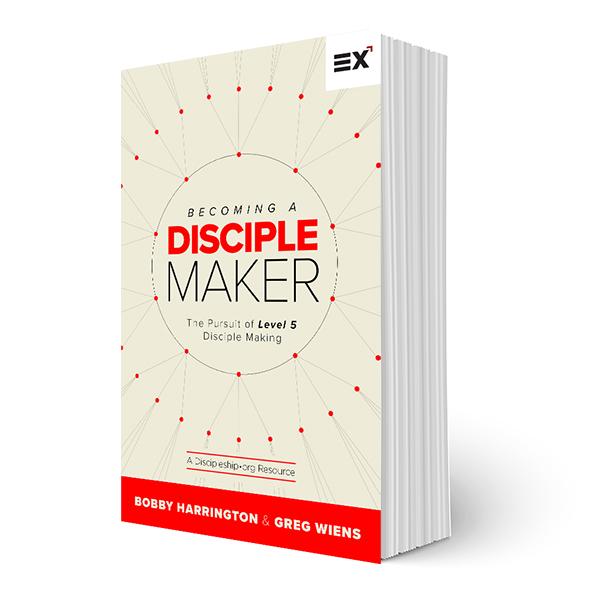We Can’t Be Like Jesus If We’re Not Making Disciples
This blog is an excerpt from the free eBook, Becoming a Disciple Maker. Download it free here.

At the beginning of my junior year of college, a guy from the apartment across the hall shared with me (Greg) what a new life in Christ would look life if I were willing to trust God with my life. As I confessed my sin and began a new life in faith, the Christian campus group I went to very naturally expected me to be part of a small group of three to four guys who were also new and growing in their faith. I immediately became a part of this group, which was healthy, fun and life-giving.
Another expectation of this campus group was that I would share my new faith with those closest to me. I didn’t understand it at the time, but the motivation was twofold: those closest to me would see a difference in my life; and others would know of the transforming power of Christ and be open to hearing about it. During the next few weeks, three individuals I shared my experience with crossed that line of faith. Just as Jesus expected His followers to share their faith, this campus organization expected the same thing from me—to help others grow into their faith as I grew spiritually and personally.
So I was barely three weeks old in my walk with Christ, and now I was responsible for these new babes in Christ, which translated into me leading a similar small group or Bible study with these three guys. I was only three weeks ahead of these guys in their growth, but it didn’t really matter. It also didn’t matter that a couple of them were much smarter than me. I was there to coach them in their growth. So for the next eighteen months, I was in my group and also leading a group. Both were simply expectations—a normal part of the disciple-making continuum.
This is from Bobby Harrington and Greg Wien’s free eBook, Becoming a Disciple Maker. Download the eBook here in your favorite format at no cost.
Just as people heard and saw Jesus teach and model disciple making, they also knew they needed to intentionally invest their lives in those who would do the same with others. This is simply what the early church understood a disciple to be. In most churches today, that approach wouldn’t pass theological or practical standards. Think whatever you want to, but when I graduated in 1976 with an engineering degree from the University of Michigan, my on-campus experience birthed in me an expectation that post-college, I would be involved in a church where I could continue being a disciple and making disciples.
Somehow in the West, we have adopted a model of ministry that precludes making disciples. I experienced this personally when I left the engineering field to become a pastor so that I could have more time to make disciples. I went to seminary and found that I wasn’t expected to make disciples. Instead, I was expected to be there for the sick and their families, preach sermons, counsel troubled marriages, manage the budget, sit on endless committees, run programs, and make copies of Sunday’s bulletin. As the lead pastor, I tried to work with several churches to change this perspective. But to no avail, I failed. I just couldn’t change the congregation’s expectations of the pastor’s role. Eventually, I started my own church but continued to struggle with the pastoral expectations that most churches have.
The authors of this blog intended readers of this content to take The Disciple Maker Assessment.
Take the Disciple Maker Assessment here at no cost.
This irony of this is that Ephesians 4 is very clear about the role of leaders and pastors—to equip (disciple) others to do the things needed in ministry. The role of apostles, prophets, evangelists, shepherds and teachers (APEST) is to make heroes of others, not be your own hero. My gifts were more centered in the apostle range, so I didn’t fit the expectation of a shepherd or teacher common to pastors in the previous generation. As I read this passage in Paul’s letter to the Ephesus church, it’s clear that God gave us these gifts to equip the body and make it mature, healthy, vibrant and multiplying.
Most church staff are not modeling disciple making. Ironically, that’s not expected anywhere else in the church either. By eliminating both the call to and practice of making disciples, we have essentially neutered the Church in the West. Visit any continent in the world other than Europe, North America and Australia, and Christianity is flourishing. In these churches, leaders and followers are not only expected to make disciples, they also naturally do it an intentional rhythm of their existence. Christianity is the fastest-growing religion in the world because in all of the other places in the world, the Church is freed up from ministry models devoid of disciple making.
*Stay tuned for the next part of Becoming a Disciple Maker by continuing to visit our blog.
Written by Bobby Harrington and Greg Wiens
Bobby Harrington is the Executive Director of Discipleship.org, a national platform, conference, and ministry that advocates for Jesus’ style of disciple making. He is the founding and lead pastor of Harpeth Christian Church (by the Harpeth River, just outside of Nashville, TN). He has a Doctor of Ministry degree in consulting and has spent years as a coach to church planters and senior pastors. He is the author of several books on discipleship, including DiscipleShift (with Jim Putman and Robert Coleman) and The Disciple Maker’s Handbook (with Josh Patrick).
Greg Wiens has been assessing leaders and organizations for over 35 years. He has worked with a gamut of organizations ranging in size and interest from Fortune 100 companies and public schools, to small non-profits and churches. He has pastored and planted churches as well as founded a number of organizations. He currently leads two missionally focused organizations: Healthy Growing Churches and Healthy Growing Leaders committed to engaging churches and leaders to multiply. Greg has co-authored two books: Dying to Restart and Daring to Disciple.






